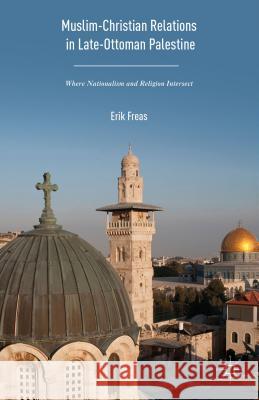Muslim-Christian Relations in Late-Ottoman Palestine: Where Nationalism and Religion Intersect » książka
Muslim-Christian Relations in Late-Ottoman Palestine: Where Nationalism and Religion Intersect
ISBN-13: 9781137570413 / Angielski / Twarda / 2016 / 314 str.
Muslim-Christian Relations in Late-Ottoman Palestine: Where Nationalism and Religion Intersect
ISBN-13: 9781137570413 / Angielski / Twarda / 2016 / 314 str.
(netto: 382,46 VAT: 5%)
Najniższa cena z 30 dni: 385,52
ok. 22 dni roboczych.
Darmowa dostawa!
Numerous factors underlie the dynamic shaping of present day Muslim-Christian Arab relations as well as the formulation of Arab national identity. In Muslim-Christian Relations in Late-Ottoman Palestine, Erik Freas argues that paramount among these were three developments that transpired in the late-Ottoman period, of which Palestine provides a microcosm. One is that non-Arabic-speaking Christian communities began to define identity in nationalistic terms on the basis of faith. Second, with their transformation into politically equal Ottoman citizens, Christians were generally more intent on taking advantage of their new rights rather than with fulfilling civil obligations. Finally, for most Muslim Arabs, the transition from identifying primarily as 'Muslim' to 'Arab' in terms of their broader communal affiliation often entailed little change in how they experienced communal identity in the day-to-day. Taken together, the analysis of these developments provides an in-depth examination of Muslim-Christian Arab relations in Palestine during the nineteenth century as well as the long-term implications of these changes on the manner of Arab national identity's formulation.











